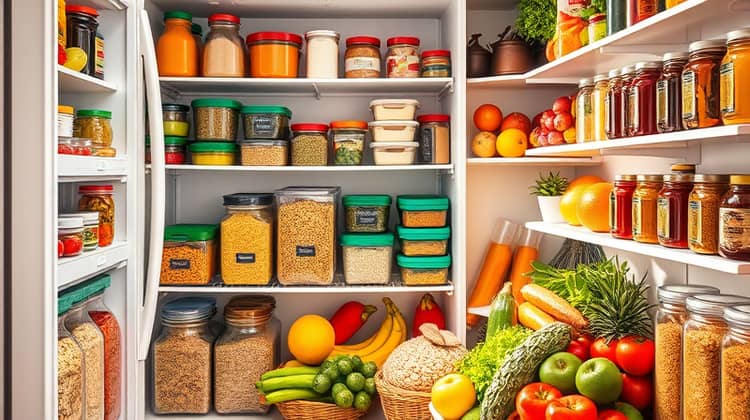In today's economy, managing food expenses can feel overwhelming, but with some strategic planning, saving money on groceries is entirely possible. By implementing smart shopping habits and meal planning techniques, you can cut costs significantly while still enjoying nutritious and delicious meals.
This article outlines ten simple strategies to help you save money at the grocery store, allowing you to spend wisely without compromising on quality. Let’s explore these cost-effective tips together.
1. Plan Your Meals

Before embarking on your grocery shopping trip, take some time to plan your meals for the week. This practice not only saves you money but also ensures that you have a well-balanced diet.
By organizing what you will prepare, you can avoid purchasing unnecessary items and reduce food waste, which is another common expense in grocery budgets.
- Select recipes that use similar ingredients to minimize waste.
- Make use of leftovers creatively by incorporating them into new meals.
- Check what you already have in your pantry before deciding on meals.
- Plan for occasional treats or dining out to avoid feelings of deprivation.
Meal planning might seem tedious, but it pays off in both savings and satisfaction, leading to improved health and less stress during busier weekdays.
2. Make a Shopping List

Creating a shopping list is a critical step when planning your grocery shopping. It helps keep you focused and discourages impulse purchases that can quickly add up.
By sticking to your list, you will be less likely to grab items that you don’t need, ultimately making your shopping experience more efficient.
- Write down everything you need based on your meal plan.
- Organize your list according to store layout to save time.
- Avoid going to the store when you are hungry, which can lead to unnecessary purchasing.
- Be flexible with brands if substituting can save you money.
Having a well-thought-out shopping list can dramatically reduce your grocery bill if you approach it with discipline.
3. Use Coupons and Discounts

Coupons and discounts are great ways to save money, often providing significant savings on items you already plan to buy. Some people successfully save a considerable amount of money by combining different offers.
By actively seeking out promotions, you can take advantage of deals and discounts, ensuring that you maximize your savings each week.
- Sign up for store newsletters for exclusive discounts.
- Use coupon apps or websites that aggregate deals.
- Participate in loyalty programs that offer cash back or future discounts.
- Check local flyers for sales before heading to the store.
While using coupons can take effort, the rewards are often worth it, allowing you to enjoy more of what you love while keeping your budget intact.
4. Buy in Bulk

Buying in bulk can be one of the most effective ways to save money over time. Many items such as grains, pasta, and canned goods are significantly cheaper when purchased in larger quantities.
Purchasing items that you know you will use often can lower your unit price, making it a worthwhile option to consider.
- Identify staple items that your household regularly uses.
- Evaluate the storage space available to ensure proper item storage.
- Consider the per unit price to determine if bulk is truly cheaper.
- Be mindful of perishable goods, as bulk buying can sometimes lead to waste.
Bulk purchasing requires thoughtful consideration but can lead to substantial savings if managed correctly.
5. Avoid Pre-Packaged and Processed Foods

Pre-packaged and processed foods are usually more expensive than whole foods, containing hidden costs such as packaging and additives. By avoiding these items, you can save a considerable amount on your grocery bill.
Instead, focus on purchasing whole ingredients that you can prepare yourself, which not only saves money but also enhances the quality of your meals.
6. Buy Generic or Store Brands

When shopping for groceries, consider choosing generic or store-brand products rather than name-brand items. Often, these alternatives provide similar quality at a lower price, allowing for substantial savings on your grocery bill.
Taking the opportunity to compare labels and prices can uncover hidden gems that are just as good as their pricier counterparts.
- Check ingredient lists to ensure quality remains consistent.
- Experiment with different types of generic products to find your favorites.
- Stock up on non-perishable items from generic brands when on sale.
- Be open to trying store brands before opting for name brands.
Taking the leap to buy store-brand products can often lead to considerable savings without compromising on quality.
7. Shop at Farmers’ Markets

Shopping at farmers' markets can be an ideal way to save money while enjoying fresh, seasonal produce. Not only may prices be lower, but the quality is often superior to that found in conventional grocery stores.
Purchasing directly from farmers also ensures that you are supporting local farming initiatives, promoting sustainability in your community.
8. Avoid Impulse Purchases

Impulse purchases can derail your grocery budget and are often driven by cravings or marketing tactics designed to entice shoppers. To avoid overspending, maintain discipline throughout the shopping process.
Staying focused on your needs can prevent these potential financial pitfalls.
- Stick to your shopping list religiously.
- Set a budget before shopping and refer to it frequently.
- Avoid shopping while hungry to reduce cravings.
- Consider shopping alone, without distractions.
By mitigating the occurrence of impulse buys, you’ll ensure that every dollar spent counts towards fulfilling your essential grocery needs.
9. Use Loyalty Programs

Many grocery stores offer loyalty programs that provide points, discounts, and special promotions to members. Enrolling in these programs can help you save money over time, as they often include exclusive savings opportunities.
Keep track of your points and check their application on your purchases to make the most of what the program has to offer.
- Take advantage of bonus point days for extra savings.
- Use points toward future purchases for instant savings.
- Receive personalized discounts based on your shopping history.
- Participate in store surveys or promotions for added rewards.
A little effort in signing up for these programs can lead to significant savings on your regular grocery expenditures.
10. Store Things Properly

After shopping, storing your groceries properly can prolong their shelf life and minimize waste, which ultimately leads to cost savings. Invest time in organizing your pantry and refrigerator to ensure you consume items before they spoil.
Understanding the best storage practices for different food types—such as fruits, vegetables, and grains—can preserve freshness and flavor, enhancing both your cooking and eating experience.
Conclusion

Saving money on groceries is not just a matter of cutting back; it involves a more strategic approach to shopping, planning, and cooking. Each of the ten methods discussed can lead to real savings and a more enjoyable cooking experience.
By adopting these habits, you can turn grocery shopping from a dreaded chore into an opportunity to save money and enjoy healthy meals.














